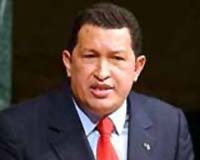| . |  |
. |
Tel Aviv, Israel (UPI) Aug 24, 2009 Israeli President Shimon Peres claims that Lebanon's Hezbollah now has an arsenal of 80,000 rockets to bombard Israel -- double the previous estimate by Israeli intelligence and almost four times the number the Iranian-backed militants possessed during their 2006 war with the Jewish state. Lebanese Foreign Minister Fawzi Salloukh has dismissed as "lies" the claim made by Peres in an interview with the Kuwait daily Al-Rai published Sunday. "I don't know how he counted these rockets." But the Israeli leader's claim has fuelled regional fears that a new conflict between Hezbollah and Israel is brewing. There has been no independent confirmation that Hezbollah has that many rockets, although it has hinted at 40,000. However, the allegation that Hezbollah, armed by Iran and Syria, has been able to amass such a vast inventory of rockets, some of them supposedly capable of hitting Tel Aviv, was seen by the jittery Lebanese as a possible pretext by Israel to justify attacking its tiny Mediterranean neighbor again. Peres was quoted as saying that Israel was "not interested" in another conflict with Lebanon and that all differences could be settled through negotiations. But, in a surprising disclosure, he admitted that Israel ran a large-scale espionage network in Lebanon. That was the first confirmation by an Israeli leader that the Mossad intelligence service was involved in large-scale spying in Lebanon after dozens of suspected agents were rounded up by Lebanese security forces and Hezbollah since November 2008. The main objective of the Israeli operation was locating Hezbollah's rocket and arms dumps, its elaborate defense system of underground bunkers, its leadership and its command centers linked by a difficult-to-penetrate, fiber-optic communications system. Lebanese security officials say the spy ring was also responsible for assassinating several Hezbollah and Palestinian figures in Lebanon and Syria between 1999 and 2008. The most prominent Hezbollah leader slain was the movement's shadowy operations chief, Imad Mughniyeh, one of the world's most wanted terrorist fugitives since 1985. He was blown up in a car bomb in Damascus, capital of Syria, Feb. 12, 2008. Hezbollah has blamed Israel and vowed to avenge him, and, according to Israeli and Western intelligence officials, has made at least three attempts to do so, including plotting to blow up the Israeli Embassy in Baku, capital of Azerbaijan, in April 2008. Asked if Israel would retaliate against any Hezbollah attack to take revenge for Mughniyeh's death that succeeded, Peres said that "obviously if Israel is attacked it will defend itself." According to U.S. analysts and diplomatic sources in the region, Hezbollah is not seeking renewed conflict with Israel at this time because it is deeply involved in advancing its political agenda in Lebanon and securing its position if Syria is lured into the Western orbit by U.S. President Barack Obama's administration. Hezbollah and its pro-Syrian allies were beaten in parliamentary elections June 7 by the Western-backed, anti-Syrian March 14 alliance headed by Prime Minister-designate Saad Hariri, son of former Prime Minister Rafik Hariri, who was assassinated in Beirut Feb. 14, 2005. Nonetheless, Hezbollah insists that it should be included in the Cabinet Hariri is still struggling to put together 10 weeks after the elections. This has paralyzed political life in Lebanon, continuing the crisis triggered by Rafik Hariri's murder. Israeli leaders have repeatedly warned that if Hezbollah is given Cabinet seats Lebanon as a state will be held responsible for any military action initiated by the group, whose guerrilla campaign drove Israeli forces out of south Lebanon in May 2000 to end 22 years of occupation. Both sides have been ratcheting up their rhetoric in recent weeks amid concerns that Israel may be planning a pre-emptive attack on Iran aimed at knocking out its nuclear infrastructure. It is widely accepted that if that happened, Tehran would order Hezbollah to unleash its rockets on Israel. That, in turn, has stirred concerns that Israel might take pre-emptive action against Hezbollah as well. On July 27 Hezbollah Secretary-General Hassan Nasrallah, who has been in hiding since 2006 following at least two attempts to assassinate him, threatened to bombard Tel Aviv if the Israelis bombed Hezbollah's nerve center in south Beirut. Parts of that quarter were pounded into rubble by Israeli airstrikes throughout the 34-day 2006 war. Share This Article With Planet Earth
Related Links
 Bases agreement gives US military free rein in Colombia: Chavez
Bases agreement gives US military free rein in Colombia: ChavezCaracas (AFP) Aug 23, 2009 Venezuelan President Hugo Chavez on Sunday charged that the controversial new US deal to use Colombian military bases means US troops can move anywhere within the South American country. "They are turning all of Colombia into a (US) base," an outraged Chavez said in his television and radio program Alo Presidente. "They cannot keep this a secret; the details are coming out. Gringo ... read more |
|
| The content herein, unless otherwise known to be public domain, are Copyright 1995-2009 - SpaceDaily. AFP and UPI Wire Stories are copyright Agence France-Presse and United Press International. ESA Portal Reports are copyright European Space Agency. All NASA sourced material is public domain. Additional copyrights may apply in whole or part to other bona fide parties. Advertising does not imply endorsement,agreement or approval of any opinions, statements or information provided by SpaceDaily on any Web page published or hosted by SpaceDaily. Privacy Statement |